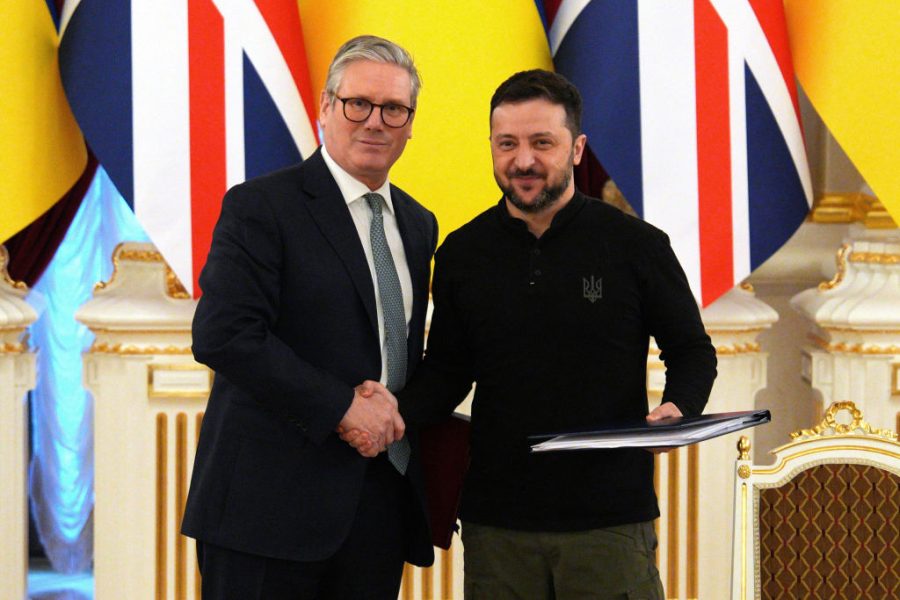There is a perverse congruence of interests between the British and Russian governments, as both sides seek to talk up London’s level of influence in Ukraine. This was particularly visible in the new agreement signed between the UK and Ukraine last week – and Moscow’s response to it.
To the Kremlin, after all, Perfidious Albion remains its most devious antagonist. True to form, the Russian embassy in London tweeted out that Prime Minister Keir Starmer’s surprise visit to Kyiv represented ‘a desperate attempt by British handlers to keep the agonising Kiev [sic] regime afloat’ with ‘new highly provocative UK plans, including the establishment of military bases within Ukrainian territory’.
It is a warning to Moscow not to ignore Europe’s own, distinct commitment to Ukraine
Of course, this flatters to deceive. There is some still-vague talk of transferring some of the training currently provided to Ukrainian troops in the UK back to Ukraine, but nothing more – and certainly nothing about bases. As for the suggestion that the British are the shadowy ‘curators’ behind the Ukrainians – a myth dating back to the notion that they would abandon a peace deal in 2022 just because Boris Johnson told them to – this comes up time and again, and ignores the evident and periodic frictions between Kyiv and London.
In her own inimitably toxic way, Russian foreign ministry spokeswoman Maria Zakharova declared the partnership ‘null and void’ and even claimed Kyiv was ‘ready to sign a deed for the sale of the country or make it a new British colony’. It is almost as if she is unaware that HMG is expensively eager to divest itself of remaining possessions such as the Chagos islands.
As is, the grandiosely named ‘one hundred year partnership agreement’ is at once more and less than meets the eye. Of course, no government can really lock its next century of successors into a specific policy, but to be honest the real specifics here are much more temporary. On the whole, the agreement and its explanatory declaration are full of generic ‘shoulds’, ‘encouragings’, ‘developings’ and ‘supportings’. The only real specifics are a commitment to maintaining the current annual provision of £3 billion a year at least to 2030 and for ‘as long as it takes’.
That last phrase has become something of a mantra, no doubt appealing to the political mind for the way it combines the ring of resolution without any pesky precision. Is it until the guns have stopped? Until all of the occupied territories are back under Kyiv’s control?
When I asked a senior FCDO figure that question a few weeks back, they were clearly annoyed by my impertinence but eventually deigned to elaborate: ‘as long as it’s needed’. When I followed up, asking ‘needed for what, and in whose opinion’, it was made clear that I had overtaxed their tolerance. The ritual genuflection to support for an ‘irreversible path’ to Nato membership for Ukraine – when and how are crucially left unanswered – is likewise less meaningful than it sounds.
Of course, it’s easy to poke fun at the imprecision and virtue-signalling of a modern political document. This is certainly full of grand but vacuous language, my own favourite – in a manner of speaking – being ‘We will crowd in others to catalyse change, leading participatory coordination mechanisms that improve cross-sectoral engagement collaboration on these important issues’. Given that one of the commitments is to develop the use of English in Ukraine, it is a shame that the text’s drafters at times seemed to writing in a mutant version of it known only to politicians and civil servants.
However, it is unfair to concentrate on the negative. First of all, most treaties are either specific and narrow or general and broad. This is a very wide-ranging agreement, covering everything from security guarantees to trade cooperation. If it reads as if the drafters decided to throw in everything but the kitchen sink (which would presumably have been called a ‘culinary hygiene and cleansing station’) to try and make the agreement as impressive as possible, this is hardly unprecedented. More to the point, it is intended to unlock future cooperation and assistance rather than trying to address everything in detail all at once.
Even more important is the symbolism of the agreement, signed in the week before Donald Trump’s inauguration. It is intended to signal to Ukraine that the UK and Europe will continue to support Kyiv, whatever may happen in DC (and Kyiv is already hyping this agreement as a model other European countries could follow). The hope is that it is also a warning to Moscow not to ignore Europe’s own, distinct commitment to Ukraine (and the Russians’ evident annoyance suggests it does have some weight).
This agreement is also a punt on Ukraine after the war, a bid to extend the UK’s soft power and build a basis for future cooperation and trade. At present, after all, Ukraine is only the UK’s 67th largest export market, accounting for 0.1 per cent of total British exports. But if it survives as a nation and is properly managed – and we have to recognise these are both serious ‘ifs’ – then it could prosper after the war. For all of these reasons, we can forgive some ugly drafting. Just about.








Comments